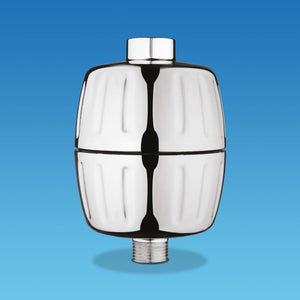Yes, you really should shower after swimming. Whether you're coming out of a chlorinated pool, saltwater pool, or even a lake, giving your body a proper rinse is more than just a good habit — it’s a crucial step for your skin and hair health. Pool water doesn’t just evaporate harmlessly.
It often leaves behind a layer of chlorine, bacteria, sweat, and other substances that stick to your skin and hair. If left on too long, these can cause dryness, irritation, and unpleasant smells.
Why Do You Need to Shower After Swimming?

Taking a shower after swimming helps counteract the effects of chlorine, other pool chemicals, and organic matter. It’s not just about hygiene — it’s about reducing exposure to irritants and maintaining the health of your skin and hair.
Removes Chlorine and Chemicals
Chlorinated water is designed to kill harmful bacteria in swimming pools, but it also affects your body. Chlorine and other pool chemicals like bromine, algaecides, and pH stabilizers can cling to your skin, hair, and even swimsuit.
Prolonged exposure to these substances without rinsing can lead to chemical reactions that dry out your skin, damage your hair, and leave an unpleasant smell. Showering helps remove chlorine and other chemicals, lowering the risk of skin problems and allergic reactions.
Prevents Skin Irritation
Skin irritation is one of the most common side effects of skipping a post-swim shower. Chlorinated pool water strips the skin’s natural oils, leading to dryness, redness, and itchiness. Those with sensitive skin are particularly vulnerable and may experience flare-ups of conditions like eczema or psoriasis.
Even swimmers with normal skin can develop rashes and discomfort over time. A post-swim shower helps restore balance to the skin and washes away irritants before they cause further damage.
Protects Hair Health
Your hair is equally at risk. Chlorine bonds to proteins in the hair shaft, causing dryness, frizz, and color fading, especially for people with dyed or chemically treated hair. In some cases, exposure to chlorinated pool water can even give hair a greenish tint due to the presence of copper and other pool chemicals.
Shampooing after swimming removes these substances before they settle into your hair. Using a deep conditioner afterward adds moisture back into your strands and protects them from breakage.
The Benefits of Showering After Swimming
Aside from removing unwanted chemicals and bacteria, showering after swimming supports a range of other health benefits that are often overlooked.
Refreshing and Rejuvenating
There’s nothing quite like the feeling of rinsing off after a swim. A warm water shower helps you feel clean, fresh, and relaxed. It’s a great way to transition from physical activity to the rest of your day.
Whether you’ve just completed a long swim workout or spent an hour at the beach, a proper shower helps reset your body and mind.
Hydration for Skin and Hair
Pool water, especially when chlorinated, has a drying effect. It strips away natural body oils, leaving skin flaky and hair brittle. Showering with clean water opens up your pores, allowing moisturizers to penetrate more effectively.
Following up with a body lotion or coconut oil helps restore moisture and strengthen your skin’s barrier. Your hair, too, benefits from post-swim hydration through conditioning products that rehydrate and seal the cuticle.
Reducing Bacteria and Germs
Even well-maintained pools and natural bodies of water can carry bacteria, sweat, and other contaminants. Showering helps remove harmful bacteria, sweat, and organic matter that may cling to your body.
This step is particularly important for people with sensitive skin, open wounds, or those recovering from illness, as their immune systems are more susceptible to infection.
The Right Shower Routine After Swimming
How you shower after swimming matters just as much as whether you shower. A proper routine will help you get the most benefit from your post-swim rinse.
What Products to Use
Choose a gentle body wash free from harsh chemicals or artificial fragrances. Ingredients like aloe vera, vitamin E, and oatmeal can soothe irritated skin and replenish moisture.
For your hair, use a sulfate-free shampoo that clarifies without stripping your scalp. A good conditioner or leave-in treatment is key to restoring softness and preventing tangles. If you swim regularly, it may help to rotate between a clarifying shampoo and a moisturizing one to avoid build-up and dryness.
Be cautious with bar soap, as some formulas can dry out too quickly after exposure to pool chemicals.
Temperature Matters
Avoid using hot water right after swimming. While it might feel good, hot water can worsen dryness and cause further irritation to skin already exposed to chlorinated water. Instead, opt for warm water to effectively remove pool chemicals without stripping the skin.
Finish with a cool rinse to help close your pores and soothe any inflammation.
Time Considerations
Don’t rush your post-swim shower. Aim to shower for at least 10 minutes, making sure to scrub your scalp, underarms, neck, and feet — areas where pool chemicals and bacteria tend to collect. Use a loofah or washcloth to gently exfoliate without causing further irritation.
How Soon Should You Shower After Swimming?
It’s best to shower immediately after leaving the pool. The longer chlorine and other pool chemicals remain on your skin, the higher the chance they’ll cause a chemical reaction.
In some cases, waiting too long can result in hives, itchiness, or a burning sensation. If you’re swimming in a public pool and can’t access a shower right away, even a quick rinse with clean water is better than nothing. Just be sure to follow up with a thorough post-swim shower as soon as possible.
How Can a Shower Filter Enhance Your Post-Swim Shower?

Most swimmers know to rinse off pool chemicals, but what about the chemicals in your tap water? Municipal water supplies often contain chlorine, fluoride, heavy metals, and other contaminants that can irritate your skin and hair just as much as pool water.
This is where a shower filter makes a big difference. AquaBliss shower filters are designed to reduce chlorine, other pool chemicals, heavy metals, and harmful bacteria from your tap water.
By filtering your shower water, you give your skin and hair the cleanest rinse possible, especially important after swimming. These filters also help reduce dry skin, allergic reactions, and other health risks tied to chemical exposure. You can browse AquaBliss' full range of shower filters here.
Can Showering Too Much After Swimming Be Harmful?
While it’s essential to shower after swimming, it’s possible to overdo it. Excessive washing — especially with hot water or harsh soaps — can strip your skin’s natural oils and lead to dryness or irritation. For swimmers who shower multiple times a day, this is a real concern.
To avoid over-washing:
- Stick to warm (not hot) water.
- Use a moisturizing body wash.
- Apply lotion or coconut oil after showering.
People with sensitive skin should be particularly mindful of their shower routine. Keeping your showers gentle and using hydrating products can prevent skin issues from developing.
Is it Necessary to Use Shampoo After Swimming?
Yes, especially if you swim in a chlorinated pool. Shampoo helps remove chlorine, salt, and other chemicals from your hair and scalp. Even if you wear a swim cap, it’s nearly impossible to keep pool water out completely.
Use a clarifying shampoo once or twice a week to remove buildup, and follow it with a deep conditioner to restore moisture. For everyday use, a gentle moisturizing shampoo is best.
Swimmers with color-treated or sensitive hair should consider a leave-in treatment or protective spray before swimming and a nourishing mask afterward.
Showering After Swimming: What You Really Need to Know
To wrap things up, here’s what matters most:
- Yes, you should always shower after swimming — whether it’s in a pool, the ocean, or a lake.
- Pool chemicals like chlorine, plus other pool contaminants, can cause skin irritation, allergic reactions, and damage to hair.
- A proper post-swim shower removes bacteria, sweat, body oils, and chemicals that cling to the skin.
- Use warm water, gentle shampoo, and hydrating body wash to restore balance.
- Install an AquaBliss shower filter to reduce chlorine and other contaminants from your tap water.
- Moisturize after every shower to protect against dryness and prevent skin problems.
AquaBliss is dedicated to helping you and your family maintain better skin and hair health with every shower. Whether you're a casual swimmer, a parent of kids taking swimming lessons, or someone who hits the pool daily, you can benefit from a clean, chemical-free showering experience.
Visit AquaBliss today to explore our shower filters and find the perfect one to complement your post-swim routine.
Don't Skip the Rinse — Your Body Will Thank You
Even though swimming feels refreshing, the residue left behind can do more harm than good if it's not properly washed away. By making a full post-swim shower part of your routine, you protect your skin from irritation, support healthy hair, and guard against exposure to bacteria and pool chemicals.
With the right products — and the added benefit of a high-quality shower filter from AquaBliss — you can enjoy swimming without worrying about what it leaves behind. Clean water is essential for recovery, and your body deserves nothing less. Stay safe, stay healthy, and never skip the rinse.







